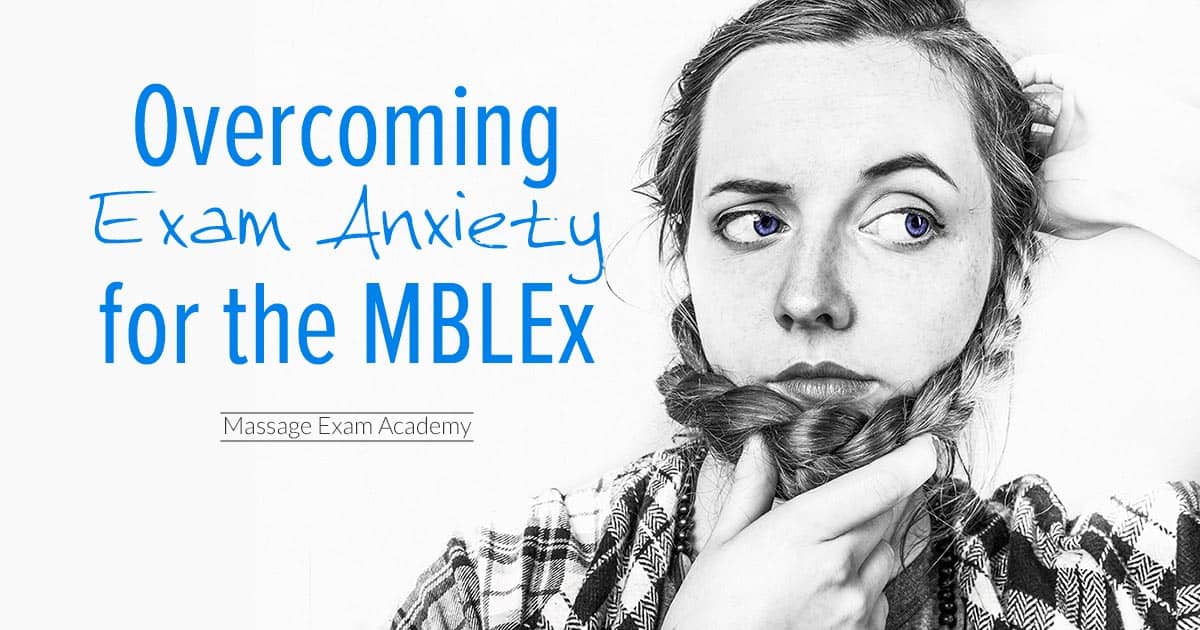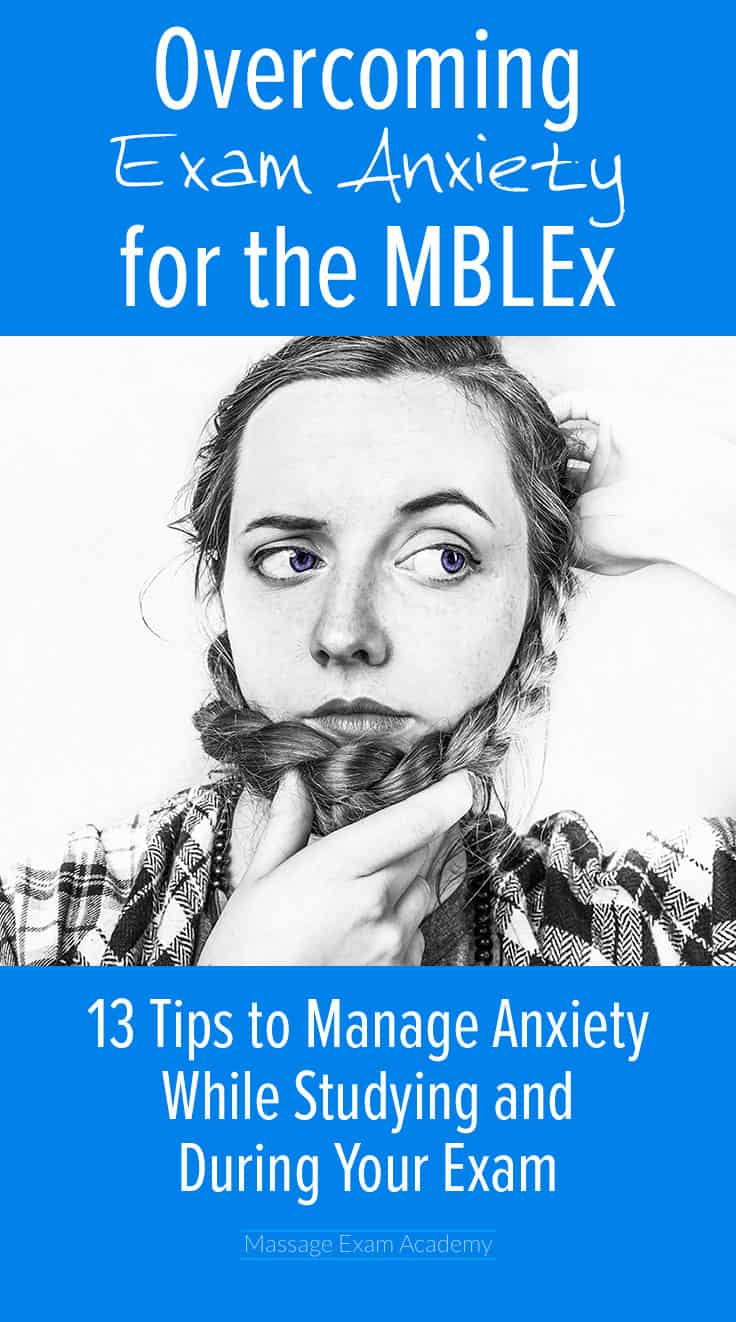
The first question I ask someone who has failed the MBLEx is, “What do you feel is keeping you from passing?” Exam anxiety is the most popular answer.
People with exam anxiety may experience the following symptoms while studying, or during an exam:
- Heart pounding
- Sweating
- Difficulty concentrating
- Sleep problems
- Nausea or other digestive disturbances
- Ringing ears or dizziness
- Shallow breathing
Often, people with exam anxiety:
- Did very well in school, love massage and want to get started with their career.
- Know the material, but are unable to translate that knowledge to a multiple choice exam.
- Are feeling pressure because they need to work, have a job waiting for them, or have been relying on their family for support. This only complicates their exam anxiety.
Does this sound like you? What is causing this anxiety?
There is a reason most of us get a little nervous during exams.
Let’s Talk Physiology
Specifically, the nervous system.
When you sit down to take your exam, or even to study for your exam, your body perceives a threat. It is preparing for battle with the MBLEx. You may think the MBLEx is threatening your future, your goals or happiness.
The fight or flight mechanism is kicking in and taking over, meaning the sympathetic nervous system has been activated.
During this activation, the body releases epinephrine (adrenaline) and norepinephrine (noradrenaline). This may cause sweating, tachycardia and difficulty concentrating. Right?
Understanding this physiological change can help you understand what is going on with your own body. Knowing why this is happening will also give you the confidence to move forward with each question.
You will likely never go into the exam with zero jitters or butterflies. You should expect some anxiety. Rest and digest will have to wait until the exam is over.
Managing Exam Anxiety
What can you do to help manage, lessen and prepare for exam anxiety? Here are my tips and suggestions.
Plan, Schedule, and Prepare
“Develop good study habits and learn the materials you will be tested on” may seem like obvious advice, but anxious thoughts and feelings can cause some people to avoid studying or procrastinate. This only fuels anxiety as the exam date approaches.
If you picked a date for your exam, discern what material you need to study and how much time you need to study each section.
My suggestion is to determine what your weakest area is and study that exclusively until you understand it. For instance, if you struggle with Anatomy and Physiology, study only that topic until you feel confident in that area. This may take a few weeks for some people. Then move on to the next topic section where you feel you need extra time to study.
Here are the sections of the MBLEx to help you plan your schedule.
- Anatomy & Physiology
- Kinesiology
- Assessment, Reassessment, and Treatment
- Benefits and Physiological effects of Techniques
- Pathology with Contraindications, areas of Caution, and Special Populations
- Ethics, Boundaries, Laws & Regulations
- Guidelines for Professional Practice
- Massage and Bodywork Modalities/Culture/History
Bonus: How to Avoid the #1 MBLEx Study Mistake – Free Lesson and Practice Quiz
Exercise
Studies consistently show exercise to be very effective for reducing anxiety. Schedule study breaks for yoga, a walk, run or other form of exercise.
It also is beneficial to engage in light exercise on your exam date, prior to test time.
Minimize Distractions
Are you making plans to move or make another life change in addition to your new career? This can complicate anxiety and study schedule. Try to minimize major life events while studying.
If you find yourself easily distracted by the internet while studying, try blocking certain apps or websites you feel are aiding in your procrastination and study resistance.
Pomodoros
Pomodoros are a time management technique to help you stay on task. You can learn more about using the Pomodoro Technique here.
Breathing Exercises
Simple breathing exercises can be used anytime and anywhere to reduce tension and stress.
Aromas
Essential oils can promote sleep, relaxation or stimulate the mind while studying.
- Sleep: Lavender
- Relaxation: Calming Blend
- Stimulating: Sweet Orange
Music
Music is a cure all for many people. It can relax, bring on a needed cry, or prepare your brain to retain information.
Meditation
Meditation does not need to take an hour of your time. Even two minutes can help promote confidence and encourage you through anxious times.
Here are 20 tips for getting started with this healthy habit.
Avoid Sugar and Caffeine
These two substances can cause the body to feel jittery or anxious. Avoid these substances if they exacerbate your anxiety. Yes, you may need to have a cup of decaf.
Rest
Resist the thought you need to pull an all-nighter, especially the night before the exam. Getting proper sleep helps you stay focused and healthy.
Color…and Learn
Coloring books are everywhere and may be the creative outlet your mind and body needs to relax or cope with stress.
Anatomy and physiology coloring books available on Amazon:
Simulate Your Anxiety
Fear of the unknown can also contribute to your anxiety. Exam simulations are a great way to combat this.
An MBLEx simulation does more than just give you sample questions to work through. It allows you to experience what 100 questions in 120 minutes feels like, and an opportunity to work through an anxious situation with your desired relaxation techniques.
Practice your breathing, positive thinking, or whatever you find helps you manage your anxious thoughts and feelings.
Seek Help
Lastly, if you feel you cannot manage your anxiety on your own, seek professional help and advice (counseling, medication, or other treatment).
Additionally, do not ignore a learning disability. If you have dyslexia, or any other diagnosed learning disability, you may qualify for a reader on your exam or extra time. Contact the FSMTB if you think you may qualify for this type of support.
“Don’t be afraid of your fears. They’re not there to scare you. They’re there to let you know that something is worth it.” – C. Joybell C.

When I try to study and see a lot of material…I can’t focus.
I commonly hear from people that are overwhelmed by the information they need to study. Breaking the subjects down into small, “digestible” sections is the best advice I have for you. That is why I recommend our section quizzes and break up the exam study guide by section.
This really helped!
Thank you so much for all the tips you give.